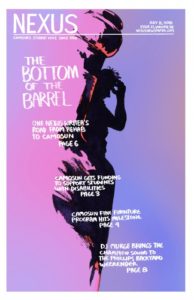If it wasn’t for death, life would be insignificant. Without the pressure of impending death, what sense of immediacy would we have in our goals and dreams for the future? We would have forever to complete them; as creatures drawn to leisure, we wouldn’t complete much at all.
If it wasn’t for death, no life would be able to exist. Death makes room for new things to grow. A world where no one and nothing ever died would be a terrifying place.
Despite these facts, the finality and ultimate mystery of death still shakes us to our core; many of us yearn for everlasting youth and immortality. We try to deny our own mortality through anti-aging products, we keep death under a mysterious curtain when a loved one passes, and, ultimately, we live in fear of the day our own lives will end. Still, death is an unavoidable part of life.

Throughout human history, our species has had a deep, close relationship with death. This relationship once allowed us to confront and accept our own mortality as an integral part of our experience. Now, ironically, with the modern world in death-denial mode, we let the life we’re clinging to slip through our fingers as we waste our lives being afraid of death.
Many of us spend time thinking about growing old and dying. I recently spoke to friends, read studies, and attempted to discover what frightens people most about death. Generally, people are not thinking about how wonderful it will be to get old or what they want for themselves after death. The idea of becoming “ugly” with age or leaving behind unfinished business are the most common fears of old age and death I have encountered. These fears are so common and pervasive that many people use up the little time they have on Earth being afraid of them. They question their goals, asking if they’re worth the risk, and waste their potential by stopping before they ever get started, scared stiff by the what-ifs until they’ve become dead on their feet.
Some say fear of death is normal. Survival instinct is a necessary part of life—it keeps us alive. That’s true, but survival instinct isn’t what I’m warning against. I’m not telling you to be reckless so you can show you’re not afraid to die. Respect for death goes hand in hand with acceptance. You don’t need to be reckless in order to die; death comes for us all in time. Instead, I warn against spending life protecting yourself from an inevitability only to lose out on the one thing you’ve been trying to protect.
The fear of our own mortality has taken days, if not weeks, from each of us. We didn’t take the trips, learn the skills, do the things that made us feel alive. But what if, like our ancestors, we spent time with death and appreciated it as a part of our natural cycle?
If we demystify death, it will encourage us to live fuller lives. Time spent worrying about what might happen will be replaced with experiences that change a boring existence of mere survival into one with a deep fulfillment of dreams and growth of vitality.
Nothing can change the unavoidable certainty of death—don’t waste your time.
Take the trip, go skydiving, learn to paint, fall in love, care for your dead, and spend time with death, because you will die, and before you do, you deserve to live.
